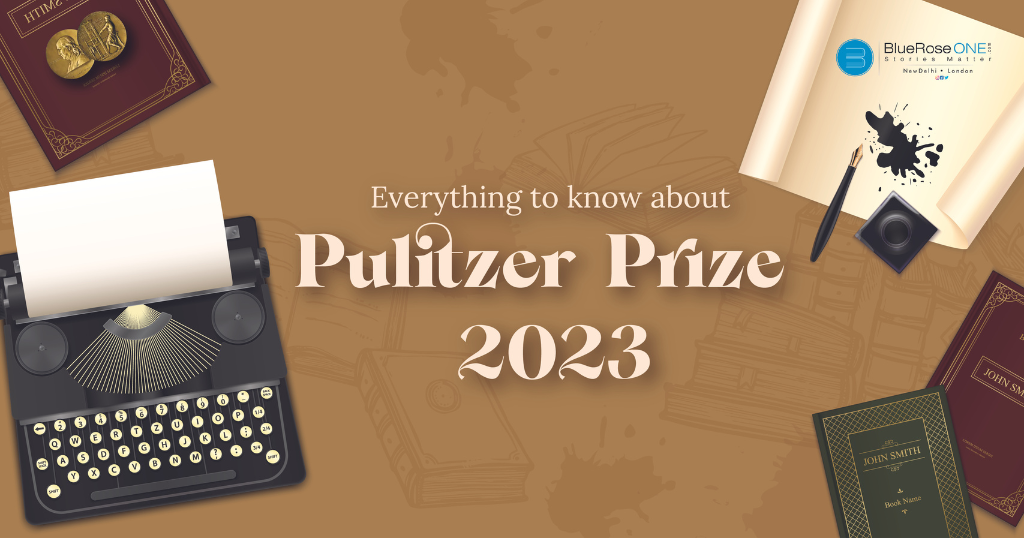The Pulitzer Prize award are recognised as a mark of brilliance and success in journalism, literature, and the arts. These distinguished honours, which were established in 1917, have a rich history, a noble motto, and a deep effect on the worlds of journalism, literature, and the arts.
Read: Instagram Book Marketing: 7 Steps on How to Promote Your Book on Instagram
In this blog, we will look at the history, motto, and impact of the Pulitzer Prizes, as well as their importance in identifying and recognising extraordinary contributions to society, as well as the winners of 2024 who shone in the world of literature.
The History of the Pulitzer Prize Awards
Joseph Pulitzer, a Hungarian-American writer, publisher, and philanthropist, created the Pulitzer Prizes. Joseph Pulitzer was a notable figure in American journalism in the late nineteenth and early twentieth centuries, recognised for his commitment to investigative reporting and role in developing contemporary journalism.
Pulitzer was the publisher of two large newspapers, the New York World and the St. Louis Post-Dispatch, and he was a firm believer in the power of the press to shape public opinion and effect good change. He bequeathed cash in his will to establish the Columbia School of Journalism and the Pulitzer Prizes to distinguish and reward achievement in journalism and the arts.
The first Pulitzer Prizes were awarded in 1917, and they initially included four journalism categories: public service, history, biography or autobiography, and the novel. Over the years, the categories have expanded to cover a wide range of fields, including fiction, non-fiction, drama, music, and poetry. Today, the Pulitzer Prize awards include 21 categories, and they continue to honour outstanding contributions in journalism and the arts.
The Motto: “For the Greater Good”
The Pulitzer Prize’s slogan is “For the Greater Good.” This slogan summarises the awards’ primary goal: to identify and reward work that serves the public interest and contributes to the advancement of society. It embodies Joseph Pulitzer’s view of journalism and the arts as effective tools for effecting good change and holding individuals and organisations responsible.
When considering entries in each category, the Pulitzer Prize board, which selects the winners, follows this credo. The Pulitzer Prizes are ultimately about rewarding art that makes a difference in the world, whether it’s investigative journalism that exposes corruption and injustice, literature that examines the human condition, or music and theatre that touch the spirit.
Influence on Journalism
The Pulitzer Prize awards have had a profound influence on the field of journalism. They serve as a benchmark of excellence and inspire journalists to pursue in-depth reporting and investigative journalism. Winning a Pulitzer Prize is a career-defining achievement, and the recognition that comes with it often leads to increased funding and support for important journalistic projects.
One of the most prestigious categories is the Pulitzer Prize for Public Service, which recognises exceptional reporting that has a significant impact on society. Many Pulitzer-winning investigations have exposed corruption, human rights abuses, and social injustices, prompting government action and societal change.
Read: What are the Advantages & Disadvantages of Print on Demand (POD)
For example, the Washington Post’s coverage of the Watergate scandal, which earned the Pulitzer Prize for Public Service in 1973, played a crucial role in holding the Nixon administration accountable and shaping modern political journalism.
The Pulitzer Prizes also encourage innovation in journalism. Journalists and news organisations strive to produce work that not only meets high ethical and professional standards but also pushes the boundaries of storytelling and presentation. This commitment to excellence and innovation helps maintain the integrity and relevance of journalism in an ever-changing media landscape.
Influence on Literature and the Arts
In addition to their impact on journalism, the Pulitzer Prize awards have significantly influenced literature and the arts. Winning a Pulitzer Prize for Fiction or Drama can catapult an author or playwright to international recognition and bestow upon their work a timeless legacy.
Pulitzer Prize-winning novels like Harper Lee’s “To Kill a Mockingbird” and Toni Morrison’s “Beloved” have become classics of American literature, exploring themes of race, identity, and societal change. These works not only resonate with readers but also contribute to the ongoing conversation about important social issues.
Similarly, Pulitzer Prize-winning plays, such as August Wilson’s “Fences” and Lin-Manuel Miranda’s “Hamilton,” have had a lasting impact on theatre, addressing topics like race, family, and history in a way that engages and challenges audiences.
The Pulitzer Prize for Music recognises compositions that expand the boundaries of classical and contemporary music, fostering creativity and innovation in the arts. This recognition often leads to performances by renowned orchestras and ensembles, ensuring that the work reaches a wide audience.
PULITZER PRIZE 2024 WINNERS
The 2023 Pulitzer Prize winners have enriched the world of literature with their exceptional contributions. These works reflect the diverse and profound stories that shape our understanding of society, history, and the human experience. As we celebrate these authors and their remarkable achievements, we are reminded of the enduring power of literature to inspire, educate, and provoke meaningful conversations about our world.
Fiction: “Demon Copperhead” by Barbara Kingsolver
In the realm of fiction, Barbara Kingsolver’s “Demon Copperhead” reigns supreme. This masterful reimagining of Charles Dickens’ “David Copperfield” introduces readers to the world through the eyes of an Appalachian boy. The narrator’s wise and unwavering voice takes us on a journey marked by encounters with poverty, addiction, institutional failures, and moral collapse. Against all odds, the young protagonist strives to conquer these formidable challenges. Kingsolver’s narrative prowess shines as she navigates the complex terrain of the human spirit and resilience.
Fiction: “Trust” by Hernan Diaz
Hernan Diaz’s “Trust” transports readers to a bygone America, offering a riveting exploration of family, wealth, and ambition. Through linked narratives rendered in diverse literary styles, Diaz weaves a tapestry of stories that examine love and power in a country where capitalism reigns supreme. This novel is a thought-provoking reflection on the complexities of the American dream and the pursuit of success.
You may also like: Online Books vs. Traditional Books | Pros and Cons
History: “Freedom’s Dominion: A Saga of White Resistance to Federal Power” by Jefferson Cowie
Jefferson Cowie’s “Freedom’s Dominion” takes readers on a historical journey through an Alabama county in the 19th and 20th centuries. Shaped by settler colonialism and slavery, this portrait of a community illustrates the evolution of white supremacy. Cowie skillfully draws powerful connections between anti-government and racist ideologies, shedding light on the complex interplay of historical forces that have shaped our nation.
Biography: “G-Man: J. Edgar Hoover and the Making of the American Century” by Beverly Gauge
Beverly Gauge’s “G-Man” offers a deeply researched and nuanced look at one of the most polarising figures in U.S. history, J. Edgar Hoover. This biography paints a complex portrait of the longtime FBI director, highlighting both his monumental achievements and crippling flaws. Gauge’s meticulous examination provides readers with a comprehensive understanding of Hoover’s role in shaping the American century.
Memoir or Autobiography: “Stay True” by Hua Hsu
Hua Hsu’s “Stay True” is an elegant and poignant coming-of-age memoir that delves into intense youthful friendships and the random violence that can disrupt our personal narratives. This thought-provoking work explores the unpredictable nature of life’s twists and turns, challenging the presumed logic of our personal stories. Hsu’s lyrical prose invites readers to reflect on the fragility of human existence.
Poetry: “Then the War: And Selected Poems, 2007-2020” by Carl Phillips
Carl Phillips‘ “Then the War” is a masterful collection of poems that chronicles American culture’s evolution. Spanning the years 2007 to 2020, these poems grapple with the complexities of politics, life in the wake of a pandemic, and our place in a changing global community. Phillips’ poetic brilliance captures the essence of a nation in transition, inviting readers to ponder profound questions about society and humanity.
General Nonfiction: “His Name Is George Floyd: One Man’s Life and the Struggle for Racial Justice” by Robert Samuels and Toluse Olorunnipa
“His Name Is George Floyd” offers an intimate and riveting portrait of an ordinary man whose fatal encounter with police officers in 2020 ignited an international movement for social change. Robert Samuels and Toluse Olorunnipa delve into George Floyd’s humanity and complicated personal story, shedding light on the unknown aspects of his life.
This work serves as a powerful reminder of the ongoing struggle for racial justice and the enduring impact of one individual’s tragic fate.
The Pulitzer Prize awards are a testament to the enduring legacy of Joseph Pulitzer’s vision for journalism and the arts. With a motto that emphasises the greater good, these awards continue to inspire and reward excellence in the pursuit of knowledge, truth, and artistic expression.
Read: How Much Should You Price Your Book? Tips for Pricing Your Book
The influence of the Pulitzer Prizes is felt not only in newsrooms and publishing houses but also in the hearts and minds of people around the world. They remind us that great journalism and artistic achievement can shape society, challenge the status quo, and contribute to the betterment of humanity.
As long as there are dedicated journalists, authors, playwrights, and musicians striving to make a difference, the Pulitzer Prizes will continue to be a beacon of excellence, celebrating work that truly matters.















